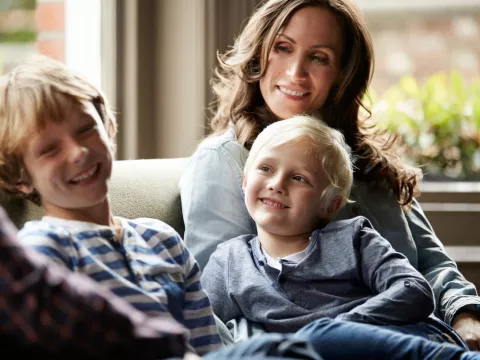- AdventHealth

If a hurricane hit tomorrow, would you know where the nearest shelter is? If a smoke alarm went off in the middle of the night, would your children know how to react? Since these situations can be hard to anticipate, we want to help you prepare as much as possible in advance. Taking time before disaster strikes to establish an Emergency Communication Plan for your family will save you future stress and confusion and could even save your life. Make it a goal to increase your awareness of community protocols, develop a personalized safety plan and share new knowledge with your loved ones.
Discuss Safety Strategies at Home
It can be tough to talk to children about scary situations. But if you're able to get them familiar with a few essential emergency plans, you'll have peace of mind that they will be more likely to stay safe in difficult circumstances. Teach them where the fire extinguishers or escape ladders are stored and how to use them. Find the best escape routes in different areas of your home. Designate a safe room (like a windowless, ground-floor bathroom) for hurricanes and tornadoes.
Its also a good idea to choose some emergency meeting places that each person can memorize. For example, you might decide that if a fire breaks out in your house, everyone inside will evacuate to the stop sign at the nearest street corner. If a hurricane evacuation is ordered while everyone is separated and away from home, maybe you decide that a centrally located park or fire station is the place where everyone will reunite.
Create a Family Facts List
Between work, school and dozens of other obligations, there's a chance your family may not be together when a disaster occurs. Compiling important info and contacts into one list that you can quickly reference will be extremely helpful in an emergency situation. Consider keeping a hard copy at home and in your car, and digital copies on your devices. Some information to include might be:
- Each family members birthday and Social Security number
- Any specific allergies or medical problems
- Everyone's individual blood types
- Phone numbers and addresses for home, work, school and friends houses
- Names of family doctors and insurance information
- In case of emergency numbers (e.g., poison control, local police, veterinarian, next door neighbors)
Learn About Community Warning Systems
Find out how the authorities in your area will warn you of a coming disaster and how they'll provide communication during and after the event. If possible, sign up for severe weather text message alerts from your local news teams and find out what radio stations broadcast alerts. Check your cell phone notification settings to ensure you're able to receive government-generated alerts, also known as Wireless Emergency Alerts (WEAs). WEAs can be sent by state and local public safety officials, the National Weather Service, the National Center for Missing and Exploited Children, and the President. Also, make sure you know how your children's school or daycare would contact you in the event of an emergency.
We hope you'll never have to face a natural disaster or dangerous emergency. But preparing and communicating your plans long before anything happens will allow you and your family to make smart, safe choices when it counts. Should you ever need help during an emergency, we're here.




